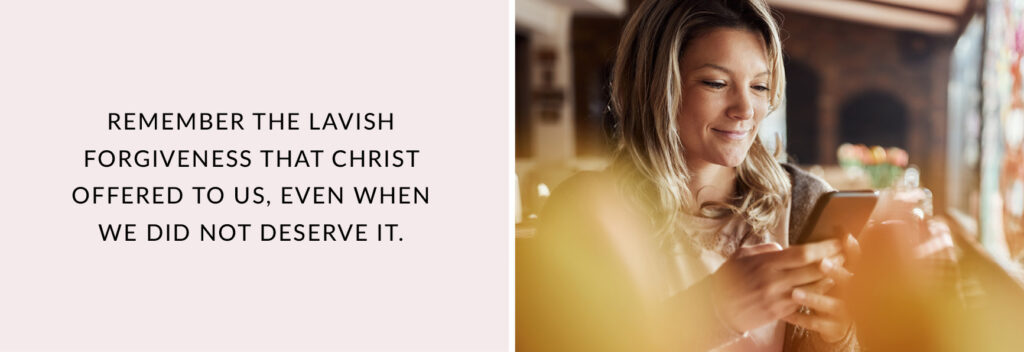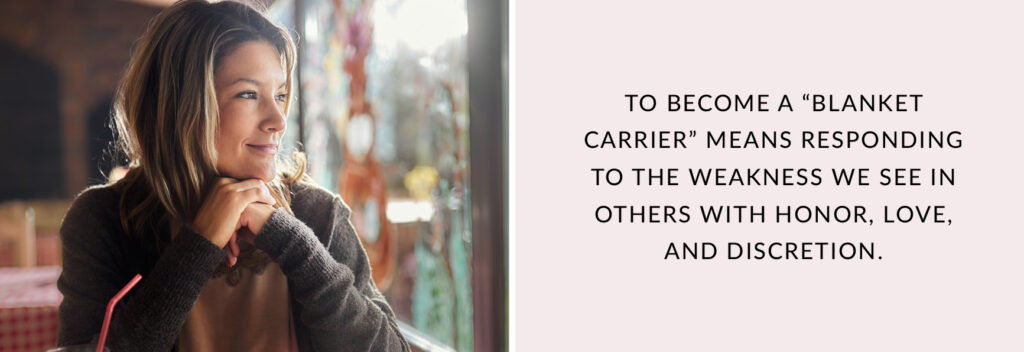Choosing a Christlike Response Toward Weakness in Others
By Leslie Ludy

A person’s discretion makes him slow to anger,
and it is his glory to overlook an offense.
Proverbs 19:11
I vividly remember a particularly exhausting season when Eric and I had recently welcomed our fourth child. We were trying to maintain our sanity with four children under the age of five, two of them still in diapers. We were in the middle of acquiring a campus and launching our discipleship training program, facing financial tests of faith, and traveling many weekends to fulfill speaking commitments. God had given us His supernatural grace and had been faithful through it all. His strength was made perfect in my weakness. But at the same time, the intense demands of daily life had left both of us feeling spent and battle weary.
It was right around that time that someone in our life — who should have offered strength and support to us — gave the opposite. Instead of offering encouragement, this person began to criticize and nitpick. Instead of offering grace and understanding, this person became a fault-finder, an accuser, and a slanderer. In a small way, it reminded me of Job’s friends who came to “comfort” him when he had been ruthlessly attacked by Satan. Though they feigned sympathy and concern, instead of supporting him in his weakest hour, they accused and discouraged him. Instead of strengthening him, they only added to his distress.
It certainly wasn’t the first time Eric and I experienced the insensitive and ignorant words and attitudes of other Christians, and it wouldn’t be the last. Throughout my Christian walk, I’ve noticed that it’s often when we are at our weakest that the enemy will work through the immaturity and vulnerabilities of others to try to weaken us even further, baiting us toward outrage, anger, or discouragement.
Maybe you can relate.
Usually, my first instinct when someone has been rude or hurtful is to share the offense with others. It brings a certain level of comfort, at least on a human level, to expose the offending person’s weakness and cause others to feel the same disgust toward their behavior as I do.
But I’ve learned from experience that Satan gets double mileage out of his attacks when we respond to offenses in an unhealthy way. Broadcasting another person’s weakness is a surefire way to cause second-party offenses, splinter relationships, sponsor mistrust, and breed discord among believers — not to mention foster bitterness in my own soul.
In my flesh, I have wanted other people to recognize how wrong this person’s behavior was and to have the satisfaction of seeing our friends become frustrated on our behalf. But in my spirit, I clearly felt God prompting me to keep the offense to myself, choose to forgive and “go on in peace and in silence,” as Amy Carmichael once said. He was asking me to cover the offense instead of exposing it.
Proverbs 19:11 says, “A person’s discretion makes him slow to anger, and it is his glory to overlook an offense” (NASB20).
“Overlooking an offense” is the opposite of what our culture, the enemy, and our own fleshly tendencies want us to do.
During a recent Uber ride I took, the driver played a popular radio talk show that invited listeners to call in and share their gripes against people in their lives (ex-spouses, ex-friends, co-workers, etc.) who had done them wrong. The hosts of the show exuberantly praised each caller for speaking publicly about their grievances.
Social media is often filled with rants and complaints against people who have offended other people. And even Christian gatherings can become a breeding ground for airing our personal hurts and offenses under the banner of authentic sharing or asking for prayer.
Overlooking an offense is very abnormal in our modern world. When we have been hurt or offended by someone, it can even feel wrong and unhealthy to simply look the other way and move on. We often think that if we choose to overlook an offense, we are indirectly making the statement that what the person did or said was okay and that they should not be held accountable for their behavior.
But overlooking an offense is far more than simply ignoring someone’s weakness or “letting them off the hook” for what they have done. It means purposely choosing honor over dishonor, and love over retaliation. It means valuing another person’s soul above our own sense of personal justice. It means considering how we ourselves want to be treated when our own weaknesses and mistakes are exposed. And it means remembering the lavish forgiveness that Christ offered to us, even when we did not deserve it.*
(*Note: In the case of abuse or danger to yourself or others, it is never right to remain silent — please go to someone in authority who is able to step in as a help and advocate for the situation.)

When we encounter human weakness, there are two ways we can respond — the human way or God’s way. The human way is to expose and broadcast weakness in others. God’s way is to cover weakness in others.
Genesis 9 records a poignant incident between Noah and his three sons after the flood:
Noah began to be a farmer, and he planted a vineyard. Then he drank of the wine and was drunk, and became uncovered in his tent. And Ham, the father of Canaan, saw the nakedness of his father, and told his two brothers outside. But Shem and Japheth took a garment, laid it on both their shoulders, and went backward and covered the nakedness of their father. Their faces were turned away, and they did not see their father’s nakedness. – Genesis 9:20–23
Noah’s youngest son saw his father’s weakness and immediately went out and broadcasted it to others. (I can almost imagine him finding glee in spreading a piece of juicy gossip about his father’s disgrace.) But the older two sons, instead of taking delight in their father’s weakness, chose honor. They carried a garment (probably similar to a blanket), walked backwards into Noah’s tent, and respectfully covered their father. One son showed dishonor by exposing his father’s mistake, the other sons showed love and discretion by covering it. Because of the dishonorable way the younger son responded to his father’s mistake, he and his descendants were cursed. And because of the grace-filled way the oldest son handled the situation, he and his descendants were blessed. (See Genesis 9:24–27.)
To become a “blanket carrier” like Noah’s older sons means responding to the weakness we see in others with honor, love, and discretion. It is one of the most notable ways we can showcase Christ’s amazing, selfless love. And yet it is one of the hardest things for us to do. In fact, it is impossible outside of the enabling grace of God.
In her book If Amy Carmichael wrote, “If I can easily discuss the shortcomings and the sins of any; if I can speak in a casual way of even a child’s misdoings, then I know nothing of Calvary love.”
Calvary is the clearest and most powerful example in history of covering human weakness with heavenly love. Human weakness was the reason Christ was on that Cross, suffering and dying for our sin — taking the punishment that was rightfully ours. Instead of exposing and broadcasting our weakness, Jesus chose to cover our sin with His blood, to cast our sin away from us as far as the east is from the west, and even to make us part of His royal family. He freely gave what we did not deserve. And He asks us to do the same for others.
When we remember what He has done for us, it should completely change the way we respond to weakness in others.
Jesus tells us, “Freely you have received, freely give“ (Matt. 10:8). Freely give grace when it is undeserved. Freely give love when our flesh wants to retaliate. Freely give honor in the face of dishonor. That is what His love did for us. And that is what His love can do through us, if only we are willing.
If you are finding it difficult to let God love through you in this way, I encourage you to consider these truth-filled words, and begin to put them into practice, by His grace:
There is no need to plead that the love of God shall fill our heart as though He were unwilling to fill us: He is willing as light is willing to flood a room that is opened to its brightness; willing as water is willing to flow into an emptied channel. Love is pressing around us on all sides like air. Cease to resist, and instantly love takes possession. // Amy Carmichael

This article was originally published in Issue 42.
For more content, explore our article collection.